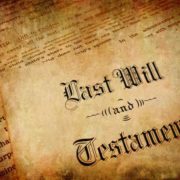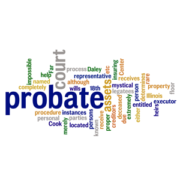How Can I Amend An Existing Will?
Cleveland, Ohio, estate planning lawyer, Daniel A. Baron, Ohio, offers the following information on what documents are necessary for you to provide your attorney when sitting down to establish your comprehensive estate plan.
One of the primary goals of drafting a will is to encapsulate the entirety of a life’s material assets and leave instructions for the dispensation of those assets after death. The other goal is to leave some legacy, emotional, spiritual, or otherwise, to friends and family by communicating final wishes so at least some minor part of ourselves persists, at least for a little bit, after we’re gone. Implicit in the pursuant of these goals is the assumption that the circumstances and realities of the present will mirror those of the future. That, however, is never the case. Time passes, the world changes, and we change with it.
More often than not, the initial draft of a will is not definitive. Family dynamics shift, executors and beneficiaries pass away, people move, assets are conveyed, trusts are established to avoid probate and preserve assets, and the law changes. As such, wills often need to be updated or outright rewritten. Wills, however, are legal documents. As such, you can’t just edit a will with red pen and call it a day. There are particular ways to change a will, each with its own rules and procedures. As always, if your will needs changing, or if you don’t have a will at all, contact an Ohio estate attorney. No one wants to leave their family a confusing or invalid will to deal with during the mourning process.
Codicil
An amendment to a will is called a codicil. Codicils are the primary way to amend a will in Ohio and are meant to amend, alter, or confirm a previously existing will. A codicil doesn’t override a will but becomes a new part of the document. Codicils must be executed with the same formalities as a will. That is, it must be in writing, signed by the person drafting it, and witnessed by two disinterested parties who either saw the person sign or heard them acknowledge their signature. Further, the testator, the person making the will or in this instance the codicil, must possess sufficient legal capacity. That is, be 18 years of age, of sound mind and memory, and not under undue threat or influence.
Codicils are largely holdovers from the past before the existence of Microsoft Word and typewriters. Back then, wills were long, handwritten, and required multiple parties to be physically present during execution. As such, a simple amendment, rather than total rewriting, saved time and expense. Nowadays, though, since wills can be quickly amended and printed, drafting a new will is preferable.
Codicils do possess some persisting utility. In a medical crisis or where a person is on an extreme fixed income, use of a codicil may be viable. Codicils, however, are potentially problematic. Codicils can be executed improperly, establish an ademption, i.e. bequeathing property no longer owned or in existence, mistakenly revoke otherwise valid will provisions, or create ambiguity during probate. Further, any codicils must accompany the associated will. So, the misplacement or destruction of a valid codicil is a major concern when probating a will. Drafting a new will avoids these problems. Contact a Cleveland estate planning attorney to see what option is preferable for your particular circumstances. At minimum, an attorney can guarantee your family can actually find a will, and all the accompanying codicils, when the time comes.
Revocation
The other method of changing a will in Ohio is revocation, and subsequent redrafting. A will is revoked primarily the following ways:
1) a testator, with the intent to revoke, tearing, canceling, obliterating, or destroying a will.
2) an agent of testator, within the presence of testator or with testator’s written direction, doing the same.
3) by another written will or codicil, signed, attested, and subscribed according to the laws of Ohio.
Further, a revocation must have the same state of mind as with will creation, i.e. sound mind and body with no undue influence.
These methods of revocation are available if a will hasn’t been filed with a probate court. In the event that a will was filed, one must file a petition with the relevant probate court, using the standardized forms provided, and ask that the will be revoked. If the court determines that the revocation is valid, it will recognize the revocation and note it in public record.
Revoking a will is often simpler than drafting codicils. Every time concurrent estate documents exist and need to be read together, considerations with conflicting and superseding terms, ademptions, and ambiguity must be addressed. Furthermore, a probate court might reject a codicil which will likely throw an entire estate plan in disarray and balloon probate costs. Such costs are borne by the estate and might outright consume any money slotted to go to surviving friends and family. An Ohio estate planning attorney is in the best position to advise on the sufficiency of an existing will and whether revocation and redrafting is justifiable in your current circumstances.
Tangible Personal Property Memoranda
Though not available in Ohio, another potential method to amend a will is with a tangible personal property memorandum, “TTPM.” Most people use simple language to bequest remaining personal property to surviving friends and family. Usually by either leaving everything to the surviving spouse or to children in proportional shares. Facially, this seems like a fair and simple way to distribute an estate. In application, though, issues often arise. Certain children may feel snubbed or offended by a particular asset distribution or manner of distribution, as often is the case when one adult child served as a caregiver for ailing parents but received the same proportional estate share that less selfless children received. Further, often estate assets cannot be spilt equally. For example, splitting a timeshare in Aspen between three children and six grandchildren. Addressing and preventing these problems is where a personal property memo comes in.
As previously mentioned, this method of will amendment is not recognized as valid by Ohio courts and will be disregarded. This places an even greater emphasis on forethought when creating an estate plan and use of clear and concise language for bequests. An experienced Ohio estate attorney will know the common pitfalls and how to avoid them.
A few hours of planning can save thousands of dollars down the line and avoid embarrassing family infighting over who gets what. Life is perpetual change and estate planning attorneys try valiantly to predict the future and address any and every circumstance. Try as they may, however, the only thing one can expect is the unexpected. Therefore, it is always wise to be flexible and not to become entrenched in now old and defunct legal documents. Even if an estate plan covers 95% of what you need, the 5% unaddressed can easily cripple any well laid plan and lead to a lifetime of savings and earnings being extinguished by taxes, creditors, or penalties.
For more information, you can contact Mike Benjamin of Baron Law LLC at 216-573-3723. Baron Law LLC is a Cleveland, Ohio area law firm focusing on estate planning and elder law. Mike can also be reached at mike@baronlawcleveland.com.
Helping You and Your Loved Ones Plan for the Future.
About the author: Mike E. Benjamin, Esq.
Mike is a contracted attorney at Baron Law LLC who specializes in civil litigation, estate planning, and probate law. He is a member of the Westshore Bar Association, the Ohio State Bar Association, the Cleveland Metropolitan Bar Association, and the Federal Bar Association for the Northern District of Ohio. He can be reached at mike@baronlawcleveland.com.
Disclaimer:
The information contained herein is general in nature, is provided for informational and educational purposes only, and should not be construed as legal or tax advice. The author nor Baron Law LLC cannot and does not guarantee that such information is accurate, complete, or timely. Laws of a particular state or laws that may be applicable in a given situation may impact the applicability, accuracy, or completeness of the preceding information. Further, federal and state laws and regulations are complex and subject to change. Changes in such laws often have material impact on estate planning and tax forecasts. As such, the author and Baron Law LLC make no warranties regarding the herein information or any results arising from its use. Furthermore, the author and Baron Law LLC disclaim any liability arising out of your use of, or any financial position taken in reliance on, such information. As always consult an attorney regarding your specific legal or tax situation.
“He who is always his own counselor will often have a fool for his client.” Old English Proverb est. circa












